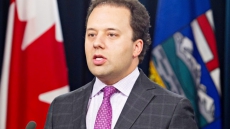OTTAWA - An agreement to cut the fees charged to merchants for accepting credit card payments likely won't save consumers money, say Canada's banks and opposition critics.
The non-binding deal, now expected to be unveiled by the Harper government next week, would see so-called interchange fees cut, and then effectively capped, for an extended period.
The Conservatives pledged in their budget of last February to reduce credit card processing fees as part of their consumer-first agenda.
But the Canadian Bankers Association, which was not directly involved in discussions, points to a study from last year that found savings were not passed on to consumers after Australia imposed a cap on interchange fees in 2003.
And NDP consumer critic Glenn Thibeault says the reduction in processing fees is so slight that consumers probably won't feel the impact.
"We still have the highest (interchange) fees in the world," and likely will even after the cuts are announced, Thibeault said, renewing his call for mandatory regulations.
"The only way the businesses can recoup the costs from these high fees is by increasing the price on goods," he said.
"If we're only seeing a 10 per cent reduction, that 10 per cent reduction might not be passed down onto the consumers because small business owners are still being gouged."
The Retail Council of Canada, on the other hand, said a study last year showed a majority of the savings from recent debit card fee reductions in the U.S. were passed on by merchants to their customers.
There are roughly 76 million credit cards issued in Canada, more than five per household, which are used to pay for about half of the overall purchases made by Canadians.
Sources familiar with the negotiations say the agreement reached this week is voluntary.
Not that the key players — Visa and Mastercard — had much choice but to make cuts, given the backlash from consumers and retailers over recent increases in swipe fees, says Karl Littler of the Retail Council of Canada.
"This is voluntary in the way that a shotgun wedding is voluntary," said Littler, the council's vice-president of provincial government relations and strategic issues.
"Banks and networks don't offer up fee cuts out of a wellspring of the goodness of their hearts. This is something that has been reluctantly agreed to by the (interchange) networks."
The agreement also upholds credit card company rules forbidding retailers from imposing surcharges on customers who use premium cards.
But it's expected those rules will be "simplified," said one source speaking on condition of anonymity because they weren't yet authorized to discuss the matter publicly.
Critics have said allowing retailers to recoup premium card fees by surcharging has failed elsewhere, particularly in Australia where strict regulations were adopted over a decade ago, leading to a variety of surcharges that served to confuse consumers who then accused retailers of gouging them.
The fee reductions, expected to be detailed by the credit card companies following a government announcement, represent a shave off the fees charged to an estimated 700,000 retailers and other businesses across the country, said one source close to the negotiations.
Merchants currently pay fees of 1.5 to 3 per cent on each credit card transaction with the higher fees charged when customers use so-called premium cards.
And they add up. The Competition Bureau estimated in 2010 that swipe fees collected in Canada totalled $5 billion annually, although more recently analysts have estimated that figure is closer to $7 billion.
In Australia, the benchmark interchange fee is capped at 0.5 per cent while it sits below 1.0 per cent in the U.K. and Switzerland.
Cuts to fees in Canada, along with a capping of interchange rates, is a move that merchants will likely be willing to accept, if for nothing else but the cost stability a cap would create, said Littler.
"It's a significant move," he acknowledged.
"There's no question that the government has wrestled with what is a complex issue, and they've used their best efforts to bring the parties to the table and meet that commitment in Budget 2014, so we are very appreciative of that."
The agreement follows months of intricate talks balancing the government's stated desire for a rate cut with legal and competitive issues among the major credit issuing firms.
The Canadian Federation of Independent Businesses said it's pleased that at least some relief is on the horizon.
"CFIB is encouraged that it appears we have an industry-led solution to this critical issue," federation president Dan Kelly said in a statement.
"We hope these changes will bring about an end to the ‘arms race’ of ever-higher tiers of premium cards."
Some merchants encourage customers to use cash or debit cards in order the cut the cost of doing business.
But many of those firms are reluctant to offer discounts to customers who avoid using credit cards and consumer advocates say cash-only buyers end up subsidizing the reward points collected by those who favour charging their purchases to plastic.





